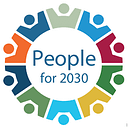People Champion Spotlight: Hawa Aw
People for 2030 is fortunate to have some very talented People Champions who embody and inspire change in their respective Country Offices. The Spotlight series aims to highlight them and their efforts. With each Bulletin, we will be featuring an interview with the hope that reading their story motivates you as much as collaborating with them energises us.
For this People Champion Spotlight, we spoke to Hawa Aw, Project Manager, UNDP Stabilization Project in the Liptako-Gourma region based at the Liptako-Gourma Authority in Ouagadougou. The project team works under the leadership of the UNDP Regional Hub in Dakar, Senegal.
Hawa has amassed a wealth of experience working with UNDP for over 21 years. She joined the Mali Country Office in 1994 as Assistant to the Head of the Operations. She worked there until 1997 before moving to New York and starting with the Regional Bureau of Africa in 1998. After spending a few years as Adminstrative Associate, Programme Associate, Personal Assistant to the RBA Director, and Country Specialist in the West Africa Cluster at the UNDP HQ, she moved back to West Africa in 2017 as the Sahel Programme Manager at the UNDP sub-regional Hub.
With these five questions, we shine a light on Hawa’s remarkable journey with UNDP thus far and her work as a People Champion.
Q1. What drew you to UNDP originally? And how has UNDP changed since?
Working with WHO and FAO in Mali in the early days of my career gave me visibility into the UN’s mission. I was inspired by its wide footprint and wanted to broaden my impact. This aspiration led me to UNDP 21 years ago when I joined the Mali Country Office.
Over time, I have noticed a shift in the way UNDP works, and three major changes that I found particularly noteworthy are (a) the availability of a wider range of opportunities for personnel, (b) the efforts of senior management to develop a deeper understanding of the needs of their team members, and (c) overall, the organization holding itself accountable to a higher standard of ethics and transparency in all forms of engagement.
Q2. What is your favourite thing about working at UNDP?
In my opinion, UNDP is an organization where people can grow as long as they are motivated to embrace available opportunities. It has been good to see that, especially in the last few years, UNDP has improved internal rules and regulations to empower personnel by focusing on developing capacities.
I myself benefited from the UNDP Education Assistance Programme, through which I completed both my Bachelor’s (in Business Administration) and Master’s degrees (in Management). After starting my journey with UNDP as an Assistant in 1994, I worked on building certain key competencies through these programmes to be promoted to roles with a wider remit. The opportunities UNDP has unlocked, together with a constant learning approach that I have tried to bring, have prepared me to be where I am today.
Q3. What motivates you to be a People Champion?
When People for 2030 was introduced, I felt I could use my experience in problem-solving to support my colleagues. I was confident that I could tap into my experience with the organization and my love for collaborating with people to drive meaningful changes in the office. This led me to volunteer to be a People Champion.
Q4. As a People Champion, what is one initiative that you have implemented in your Country Office to transform the work culture?
One of my main efforts has been to ensure that my colleagues are aware of the People for 2030 initiatives so that they can make the most of them. I would like to highlight here that colleagues in both, the Dakar office as well as the sub-regional Hub, considered the initiatives under the strategy to be people-centered in their approach and therefore welcomed them. This made my task as a People Champion much easier!
I started with hosting meetings to present the Global Staff Survey results and also tried my best to involve colleagues in certain decision-making processes. For example, I suggested that we introduce smaller working groups to ideate and activate changes across the two offices. I was amazed at the reaction of people and it has been very fulfilling to see the results emerging from this. For instance, through one such outcome, we created a green environment in the Dakar office — a green space, full of flowers, where people can come together and take a break from their screens. Steps like this have helped us foster a culture of well-being and promote healthy practices.
In addition to this, as part of a global People Champion network, I believe there is an opportunity for us to foster knowledge exchange across Country Offices. To this end, I also helped the Mauritania Country Office roll out People for 2030 during their annual retreat.
Q5. What’s a fun fact about you many people may not know?
I love cooking. In fact, what I truly love is inviting people over and cooking for them. In my spare time, my sisters and I engage in cooking challenges with each other. Only the other day, we made a traditional dish from Mali — Tô (also spelled Toh, rhymes with dough), in record time!
